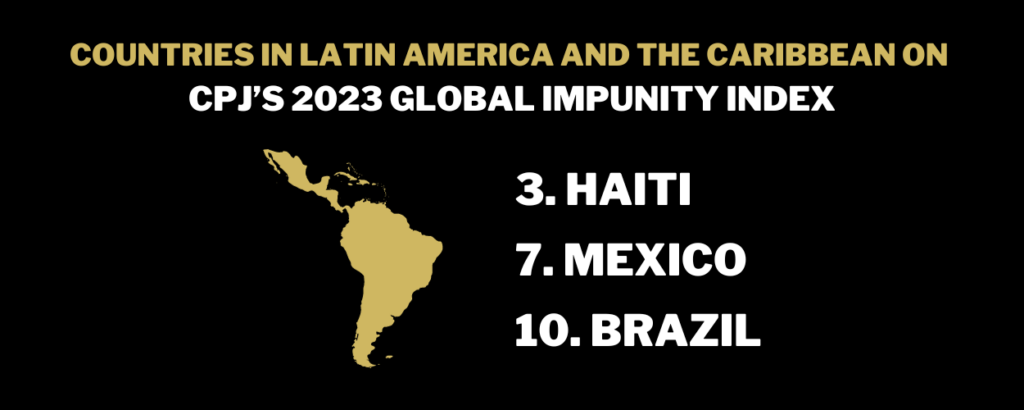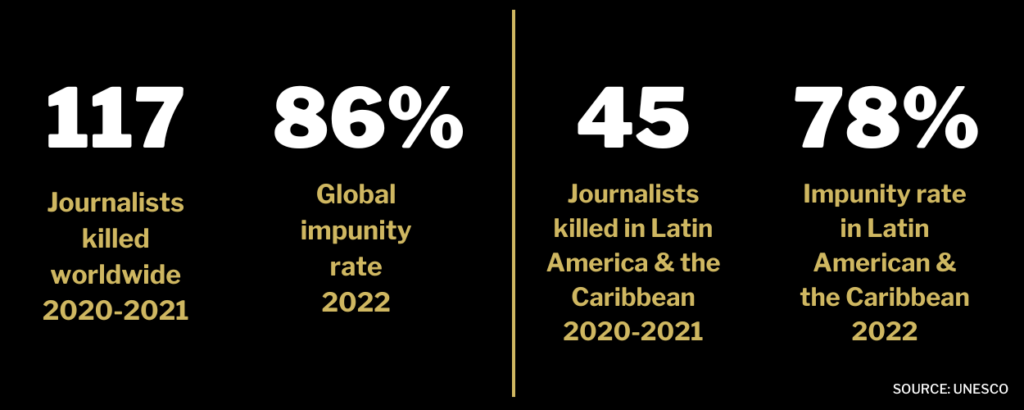Nov. 2 marks the 9th International Day to End Impunity for Crimes against Journalists. On this day, the UN General Assembly urges Member States to prevent violence against journalists and media workers, ensure accountability through investigations and bring those responsible to justice.
“We have registered 517 cases of journalists killed in the Americas during 25 years. That's a dramatic figure that should be taken into consideration very seriously by Member States and also our societies,” Pedro Vaca, Special Rapporteur for Freedom of Expression (RELE) of the OAS’ Inter American Commission on Human Rights (IACHR), told LatAm Journalism Review.
Vaca emphasized the chilling effect these murders have on others working in the media and the larger impact of their deaths on democracy.
This Nov. 2, he urged stakeholders “not only to commemorate, to honor, but also to take action on the claim for justice.” Specifically, he highlighted a need for officials to focus on their words and to stop the stigmatization of journalists.
According to UNESCO’s records, 313 journalists were killed in Latin America and the Caribbean from 2006 to 2021, and just 68 cases are considered resolved. That’s an impunity rate of 78%.
Three countries in the region rank within the top 10 of the 2023 Global Impunity Index from the Committee to Protect Journalists (CPJ): Haiti (3), Mexico (7) and Brazil (10). This ranking records “where murderers of journalists are most likely to go free.”

Although the index points to a slight improvement in the global impunity rate (78%) compared to a decade ago (90%), CPJ noted that this should not be viewed with great optimism.
“In reality the problem remains exactly the same. The data do not fluctuate in a way that there has been significant progress, but rather the message is the opposite: impunity is part of the system, which means that there is not complete justice for the vast majority of cases of murdered journalists,” Carlos Martínez de la Serna, CPJ program director, told LJR.
Haiti is part of the index for the first time, while Mexico has been present since CPJ first published it 16 years ago. Brazil has been on the list for 14 years.
“What countries like Mexico or Brazil, where there are certain resources and protection mechanisms, need is a systemic response so that there is justice. And that requires, among other things, [working] on the prevention part to prevent more murders,” Martínez said. “But then, when there are these crimes, it is necessary, among other things, [to have] an independent justice system with resources to be able to carry out investigations and advance justice. And also political will to adopt these resources and to make these issues priorities.”

While it’s a day to remember violence suffered by those who work in media and the lack of progress in an overwhelming majority of their legal cases, it’s also a day to fight for justice.
CPJ noted that justice has been achieved in cases where the following changes and tools have been implemented: new political leadership, legislation, advocacy by rights groups, universal jurisdiction and international pressure.
For example, CPJ highlighted the case of Peruvian journalist Hugo Bustíos who was killed in 1988 during a time of internal conflict between the government and leftist guerilla groups, namely, the Shining Path. Two officers were convicted in the case in 2007 and retired army general Daniel Urresti was convicted and sentenced to 12 years in prison in April 2023 for being ‘co-perpetrator’ in Bustíos’ murder. CPJ pointed out that a 2002 decision by the Peruvian Supreme court to strike down an amnesty law protecting military officers from persecution in human rights cases paved the way for justice in this case.
“The Bustíos case seems very significant to me. It took 35 years, 35 years! Justice in cases of crimes against journalists, when it comes – most of the time it does not arrive – comes very late and after some enormous twists and turns," Martínez said.
This year, the main commemoration for International Day to End Impunity for Crimes against Journalists will take place at the headquarters of the Organization of American States (OAS) in Washington D.C. on Nov. 2 and 3.
Additional events will take place around the world, including in Bolivia, Costa Rica, Mexico and the United States.
At LatAm Journalism Review (LJR), we’ve produced a special project highlighting four cases of impunity in violence against journalists. We encourage you to read, watch and share these journalists’ stories using #EndImpunity.